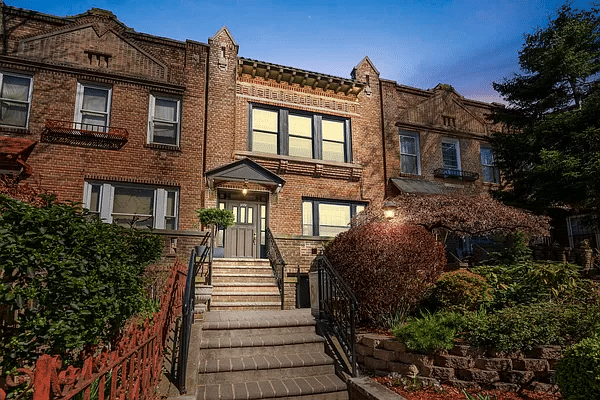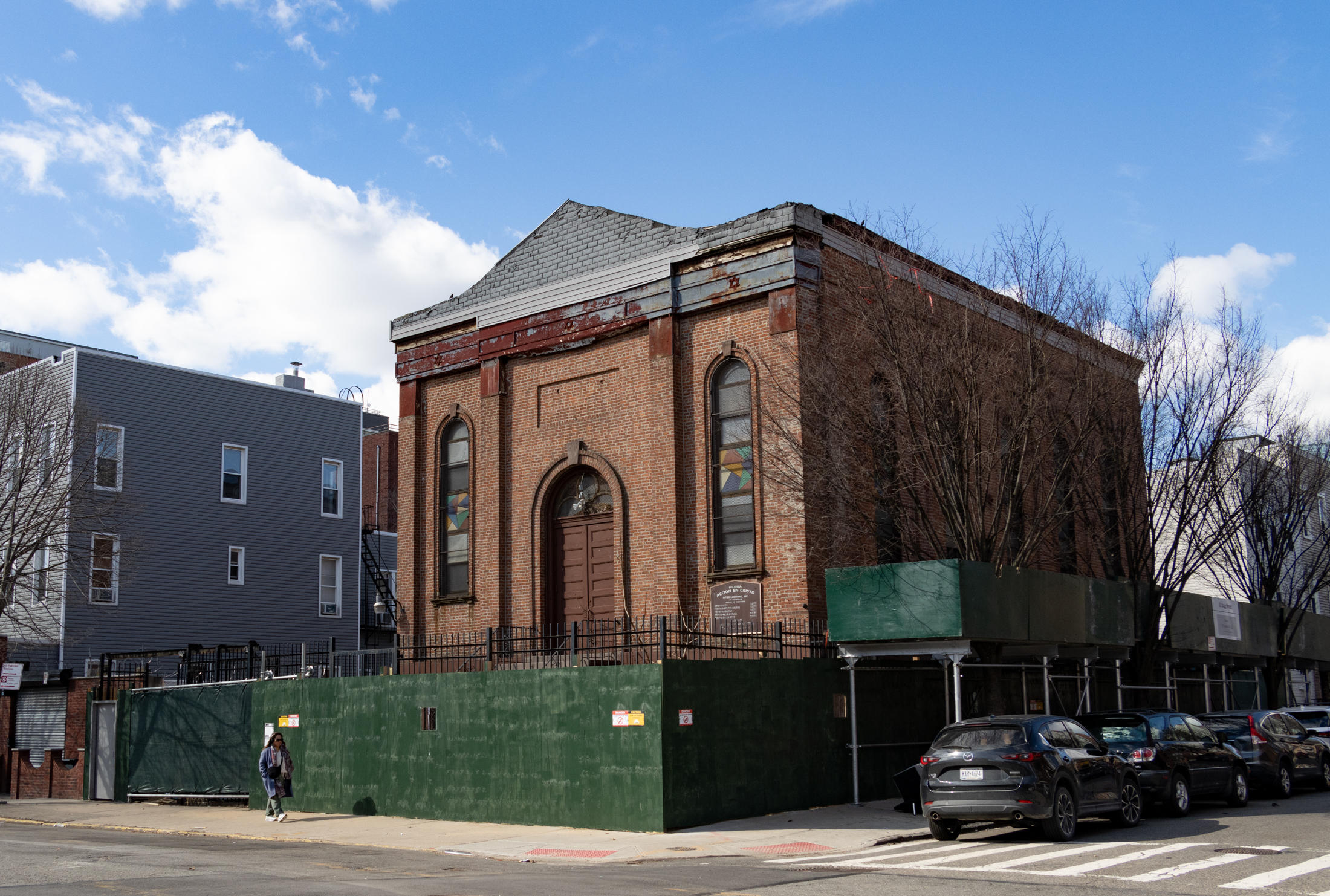Walkabout: The Colonel of the 47th Regiment, Part 1
Read Part 2 of this story. As happens often when I am researching a property or topic, larger than life people pop up who may be only a small part of the story I am researching, but are worthy of a larger piece of their own. Yesterday’s Building of the Day brought to light Colonel…

Read Part 2 of this story.
As happens often when I am researching a property or topic, larger than life people pop up who may be only a small part of the story I am researching, but are worthy of a larger piece of their own. Yesterday’s Building of the Day brought to light Colonel Edward F. Gaylor, a leader of one of Brooklyn’s National Guard units and the commander of one of our large armories. He was also a real estate speculator, a developer and an architect.
That would be worthy of an interesting paragraph or two, except for the fact that the more I looked into his background, the more it became apparent that there was a real story here. The Colonel was quite a character.
I was not able to find a photograph of him, so I always try to imagine who would play him in the movie. It needs to be someone who can be dedicated and energetic, arrogant and officious, a real s.o.b., but a man with dreams and drive, smart enough to see the future and try to be a player in it.
Yet, with all of his drive and ambition, he was a man with so many flaws; you have to have some pity for him, which he would probably hate. I think Christian Bale could play him — all hard edges but amply flawed. Here is his story. You be the judge.
Edward F. Gaylor was the son of Brooklyn builder and architect William H. Gaylor. The elder Gaylor is the architect of record on many buildings in Williamsburg, the Eastern District, Clinton Hill and elsewhere including row houses and two large theaters, one of which is the quite impressive former Bedford Avenue Theater, now the Soma Health Club.
He also was listed as the carpenter in a Williamsburg church, a builder in several others, and later in his career he was appointed Brooklyn’s Commissioner of Buildings by Mayor Seth Low in 1884. His other son, John, was also an architect and builder who worked with his father.
Young Edward was brought up in Williamsburg in financial comfort surrounded by the family business of which he was a part, but it was not his primary interest. Edward Gaynor wanted to be a military man. So he enlisted with the National Guard and was assigned to the 47th Regiment stationed in Williamsburg.
He took to military life quite well, and rapidly began advancing in rank. In 1876 he was promoted from second lieutenant to First Lieutenant of Company K of the 47th Regiment. Only a few months later he was promoted to Captain of Company K, and, in 1881 he found himself promoted once again, this time to the rank of major.
In 1884, the same year his father became Buildings Commissioner, Edward Gaylor was promoted to Colonel and was given command of the 47th Regiment. The Brooklyn Eagle gushed that Gaylor was an excellent choice as he was an Eastern District man, born and bred, as well as a gentleman and man of connections, prominent in social, business and professional circles.
The paper looked forward to Gaylor leading the regiment, as it was mostly comprised of local soldiers, and who better to lead them than one of their own elite? Gaylor already had plans for the regiment, including new uniforms and a new bugle corp.
That October all of Brooklyn’s regiments gathered at the Prospect Park Parade Grounds for drills and inspections along with a grand parade. The 47th came in their civilian clothes and were then presented with their new uniforms, in which they proudly paraded during the drill exercises.
Then, along with other companies, they proceeded to march much of the way back to Williamsburg. Plans were in place to build the 47th a new armory, and it looked as if the new colonel and his troops were off to a great start, but it didn’t last long.
A year later, in 1885, Captain George Davenport and his first Lieutenant, Stanley Oliver of Company K, 47th Regiment, tendered their resignations from the Guard. This was seen as strange, as both had excellent records and they and the company were about to move into their brand new armory, taking on more important roles in their military careers. But soon the details started to come out.
When the company had been out on training exercises in Peekskill, Colonel Gaylor had a problem with one of the sergeants, accused him of insubordination and had him removed from the regiment. The Captain and his Lt. protested the removal. They found the Colonel to be particularly insulting and unreasonable, and they quit in protest. This would not be the last time this happened. It appeared that Colonel Gaylor was not an easy man to get along with.
By January of 1886, it was open knowledge, as it was all there in the Brooklyn Eagle, that Colonel Gaylor was not beloved by his troops. He was supremely ambitious and would walk over anyone to get ahead. He had been chosen to lead the regiment, not on the recommendations of his peers, but because of a power play going on between other commanders and officers which left him as one of the only viable candidates. As soon as he was elevated to the position, some of those officers quit as well.
The 47th was a well-respected regiment, had won many accolades, and had just moved into its very expensive, very large new armory. It was the talk of the town.
The paper said, “such dissatisfaction as has existed in the regiment has been caused by the alleged ambition of Colonel Gaylor to rule supreme, and by what is believed by many to be his readiness to snub anyone, officer or private, who should presume to intimate that he was entitled to a share of the honor which had, since the opening of the new armory, been showered thickly upon the command.” This was said to go especially badly with men who had “been soldiers when the Colonel was a school boy.”
The Colonel, the paper went on to say, patronized and insulted everyone. He ignored his officers and patronized and ridiculed them not only amongst the men, but also in social situations, which really didn’t endear him to them. Apparently he knew no one liked him, but he really didn’t care much about that either. He honestly believed it was all about him.
One night, a group of prominent Eastern District men, including Colonel Gaylor and a General Brownell, ran into the former commander of the regiment, Colonel Conover, at a local public establishment. The talk over many drinks went to how grateful a commander had to be to those he commanded, and how no leader was greater than the men who had made him successful. Colonel Gaylor disagreed vehemently.
“‘I ask you now,’ said Colonel Gaylor, in tones so loud and fierce as to attract the attention of everyone in the place, ‘if the 47th Regiment under me hasn’t been a success?’ Colonel Conover replied, ‘It has, and you ought to be grateful to the men who have helped you make it a success.’ Colonel Gaylor said, ‘I am not. I am grateful to nobody. I made this regiment what it is and I don’t propose to have anyone else take credit for it.'”
The conversation continued in that vein, and Gaylor went on to insult and dismiss General Brownell, calling him irrelevant to the company’s success as well. Then Colonel Gaylor said, “‘Every officer and man in that regiment has to be a Gaylor man.
If he is not, he can’t stay in the regiment.’ Conover – “You mean to say that you own the regiment?” Gaylor – “Yes, I am the regiment.” Conover – “What? You and no one else the regiment?” Gaylor – “Yes, I am the 47th Regiment,” Conover sneered, “A fine looking 47th Regiment you’ll make all by yourself.”
Needless to say, it went downhill from there. Gaylor proceeded to insult Conover’s record, and the two continued to make a scene. Finally General Brownell got Gaylor to leave, but it was too late. The conversation was the talk of the pub, the talk of the Brooklyn Eagle, and on the lips of every guardsman in the 47th Regiment by the next day. As far as they were concerned, Colonel Gaylor could be the 47th Regiment all by himself, if that’s what he wanted.
OK, so Edward Gaylor was a puffed-up, arrogant sod. Entertaining, but certainly not overly newsworthy, you think. Well, the story gets stranger, and Colonel Gaylor’s life takes a dramatic turn in directions one would just not believe. There is money, (there’s always money) real estate, alcohol, jail, and the end of a career, or two, or three. Please join me for the conclusion of the Colonel’s story, next time.
Postcard of 47th Reg. Armory, early 20th century)









What's Your Take? Leave a Comment